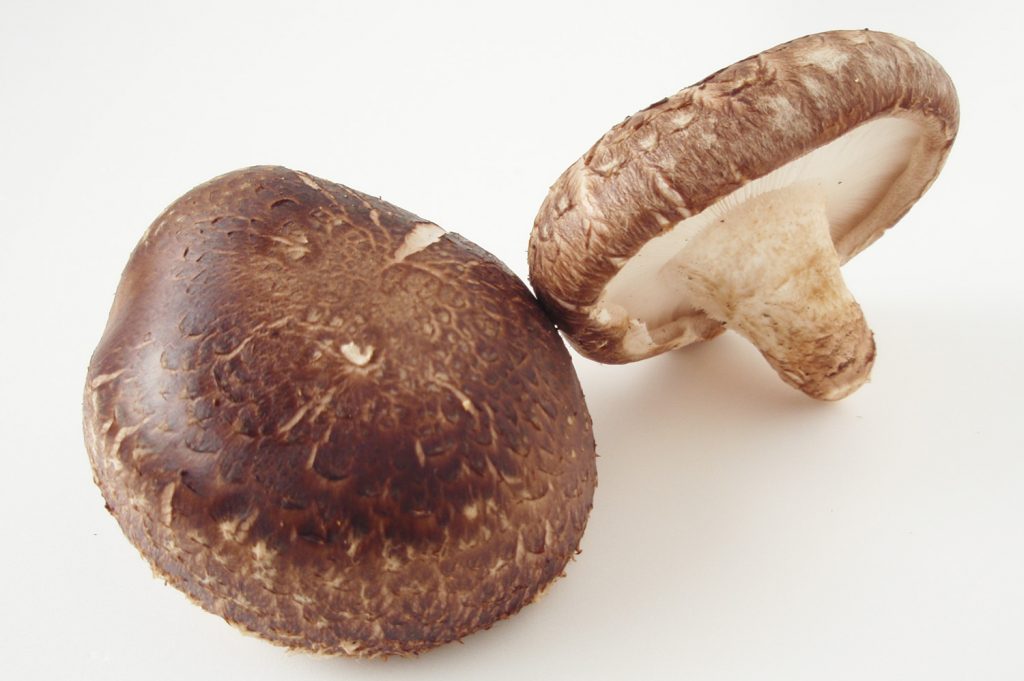
The medicinal mushrooms – maitake, shitake, reishi (Ganoderma), coriolus and oyster have anti-tumour and immune strengthening effects.
Maitake D-fraction caused regression or significant symptom improvement in 58.3 percent of liver cancer patients, 68.8 percent of breast cancer patients, and 62.5 percent of lung cancer patients.
The combination of reishi (Ganoderma lucidum) and green tea have a synergistic effect in suppressing the growth and invasiveness of metastatic breast cancer. The extracts from the stipes (stem) of the Ganoderma tsugae and wildly grown Ganoderma sinense inhibit cancer cell growth more strongly than other parts of the mushroom, while extracts from the stipes of Ganoderma lucidum and Ganoderma sinense showed strong immune enhancing effects on spleen lymphocytes.
Coriolus versicolor is able to cause cell death in various types of breast cancer cells.
Shitake mushrooms inhibit growth of breast cancer cells and improve quality of life and natural killer cell activity in patients undergoing chemotherapy for breast cancer.
Oyster mushrooms inhibit both breast cancer and colon cancer tumour growth.
Edible mushrooms are a good source of protein, 200–250 g/kg of dry matter; leucine, valine, glutamine, glutamic and aspartic acids are the most abundant. Mushrooms are a good source of vitamins, with high levels of riboflavin (vitamin B2), niacin, folates, and traces of vitamin C, B1, B12, D and E. Mushrooms are the only nonanimal food source that contains vitamin D and hence they are the only natural vitamin D ingredients for vegetarians. Wild mushrooms are generally excellent sources of vitamin D2, unlike cultivated ones; usually cultivated mushrooms are grown in darkness and UV-B light is needed to produce vitamin D2
- A phase I/II trial of a polysaccharide extract from Grifola frondosa (Maitake mushroom) in breast cancer patients: immunological effects.
- Can maitake MD-fraction aid cancer patients?
- Combined effect of green tea and Ganoderma lucidum on invasive behavior of breast cancer cells.
- Comparative studies of various ganoderma species and their different parts with regard to their antitumor and immunomodulating activities in vitro.
- Differential anti-tumor activity of coriolus versicolor (Yunzhi) extract through p53- and/or Bcl-2-dependent apoptotic pathway in human breast cancer cells.
- Effect of Maitake (Grifola frondosa) D-Fraction on the activation of NK cells in cancer patients.
- Ganoderic acids suppress growth and invasive behavior of breast cancer cells by modulating AP-1 and NF-kappaB signaling.
- Ganoderma lucidum (Reishi) in cancer treatment.
- Ganoderma lucidum inhibits proliferation of human breast cancer cells by down-regulation of estrogen receptor and NF-kappaB signaling.
- Ganoderma lucidum suppresses growth of breast cancer cells through the inhibition of Akt/NF-kappaB signaling.
- Immunomodulatory activities of Yunzhi and Danshen in post-treatment breast cancer patients.
- In vitro cytostatic and immunomodulatory properties of the medicinal mushroom Lentinula edodes.
- Inhibition of growth and induction of apoptosis in human cancer cell lines by an ethyl acetate fraction from shiitake mushrooms.
- Inhibition of oxidative stress-induced invasiveness of cancer cells by Ganoderma lucidum is mediated through the suppression of interleukin-8 secretion.
- Pleurotus ostreatus inhibits proliferation of human breast and colon cancer cells through p53-dependent as well as p53-independent pathway.
- Polysaccharopeptide enhances the anticancer activity of doxorubicin and etoposide on human breast cancer cells ZR-75-30.
- The immunomodulator PSK induces in vitro cytotoxic activity in tumour cell lines via arrest of cell cycle and induction of apoptosis.
- The use of mushroom glucans and proteoglycans in cancer treatment.
- Efficacy and safety of orally administered Lentinula edodes mycelia extract for patients undergoing cancer chemotherapy: a pilot study.
- Edible mushrooms: improving human health and promoting quality life.



